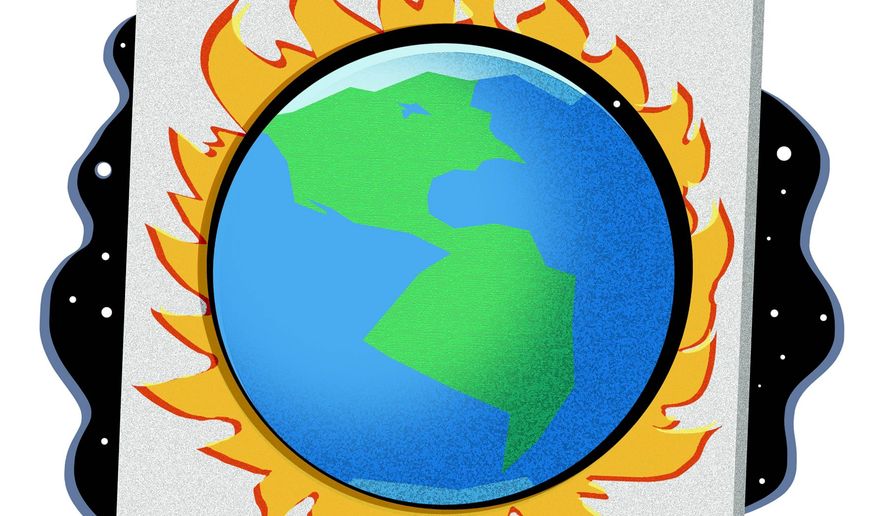OPINION:
Imagine that United Nations Secretary-General Ban Ki-moon held a news conference to announce that the Islamic State does not threaten the Western world. “All we need do is see the world through their eyes, and we will all get along fine,” Mr. Ban might say to the assembled reporters.
Media representatives would demand to know if the U.N. chief had lost his mind. Their reports on Mr. Ban’s remarks would be scathing. In other words, reporters would act like professional journalists, skeptical inquirers who assess the authenticity of what they are told by authorities.
However, when it comes to covering climate change, even the toughest reporters usually become milquetoast, mere repeaters of political correctness akin to writers for China’s official government newspaper, People’s Daily.
The reporters attending the U.N. Intergovernmental Panel on Climate Change news conference in Copenhagen on last week are a case in point. When introducing the IPCC Synthesis Report, Mr. Ban confidently told media representatives, “Human influence on the climate system is clear — and clearly growing . The atmosphere and oceans have warmed … science has spoken. There is no ambiguity in their message.”
Why did not a single reporter present ask the secretary-general how his remarks jived with the 18-year pause in global temperature rise evident in balloon, surface and satellite temperature records? Why did they not point out that the oceans have not warmed since 2003?
More importantly, why did journalists not ask Mr. Ban how he could be so confident that climate calamity is imminent when the computer models he is relying on have repeatedly failed in the real world? Why did reporters not point out that the Nongovernmental International Panel on Climate Change, the reports of which cite thousands of scientific references in leading peer-reviewed journals, demonstrates that there is massive ambiguity in the messages coming from scientists?
In other words, why didn’t reporters do their jobs?
It is not just the journalists present at last week’s news conference who are letting us down with their naive reporting on climate change. Most media covered the event without criticism.
The Guardian newspaper was among the worst, uncritically reporting the IPCC’s warning “that carbon emissions will ultimately have to fall to zero” and IPCC Chairman Rajendra Pachauri’s ridiculous boast that “[w]e have the means to limit climate change.” Rather than cite climate experts who dismiss such statements as propaganda, Guardian reporter Damian Carrington only used quotations from sources guaranteed to support the U.N.’s claims.
Or how about the Los Angeles Times, which has publicly stated that it will not publish letters to the editor that disagree with political correctness on climate change? The newspaper dutifully reported on the Synthesis Report’s sensationalist conclusions, also citing only experts who agree with the IPCC’s mantra. The Los Angeles Times even editorialized, “Actions by the world’s governments over the next year will reveal whether the science has ignited meaningful action on cutting emissions,” totally ignoring that “the science” includes opinions that contradict the point of view the newspaper holds dear.
Since few reporters have the background to rationally adjudicate between competing scientific theories, what is it about climate change that causes so many journalists to become mere ambassadors of politically correctness? Traditionally, skepticism is usually associated with those on the left of the political spectrum, people who disdain absolute assertions from powerful authorities. When it comes to global warming, though, skepticism and their much-vaunted tolerance for alternative viewpoints vanishes, and left-wing reporters become mere propagandists, morphing into what they claim to despise.
Perhaps it is just a matter of job security for reporters to give editors the articles they need to generate exciting headlines to boost media sales. More likely it is just a myth that the left are more tolerant and more skeptical than the rest of society. After all, tolerance of nonconformity is no more a characteristic of left-wing dictatorships than those on the right.
Regardless, “group-think,” fear of being out of step with their intellectual fellow travelers, is clearly an important driver compelling conformity among left-wing reporters covering climate change. Environmentalism, especially concerns about climate, is now firmly established as a cause “progressives” are expected to support without question. While the media’s support for early environmentalism, the 1970s crusade of anti-establishment hippies, was not surprising, the movement is very different today — more than $1 billion a day is spent on climate finance alone, for example. Today’s green lobby is driven by many factors other than protecting nature: enriching alternative-energy companies, carbon traders and environmental groups, expanding government control over the lives of their citizens, and so on.
Whether emissions of carbon dioxide from human activity are causing dangerous climate change or not is an exceptionally difficult science question. Leading experts cannot agree on the causes of these changes or what future awaits us. It’s about time the media stopped pretending they know the answers to these mysteries and just tell us the whole story.
Tom Harris is executive director of the Ottawa, Canada-based International Climate Science Coalition (ClimateScienceInternational.org).




Please read our comment policy before commenting.